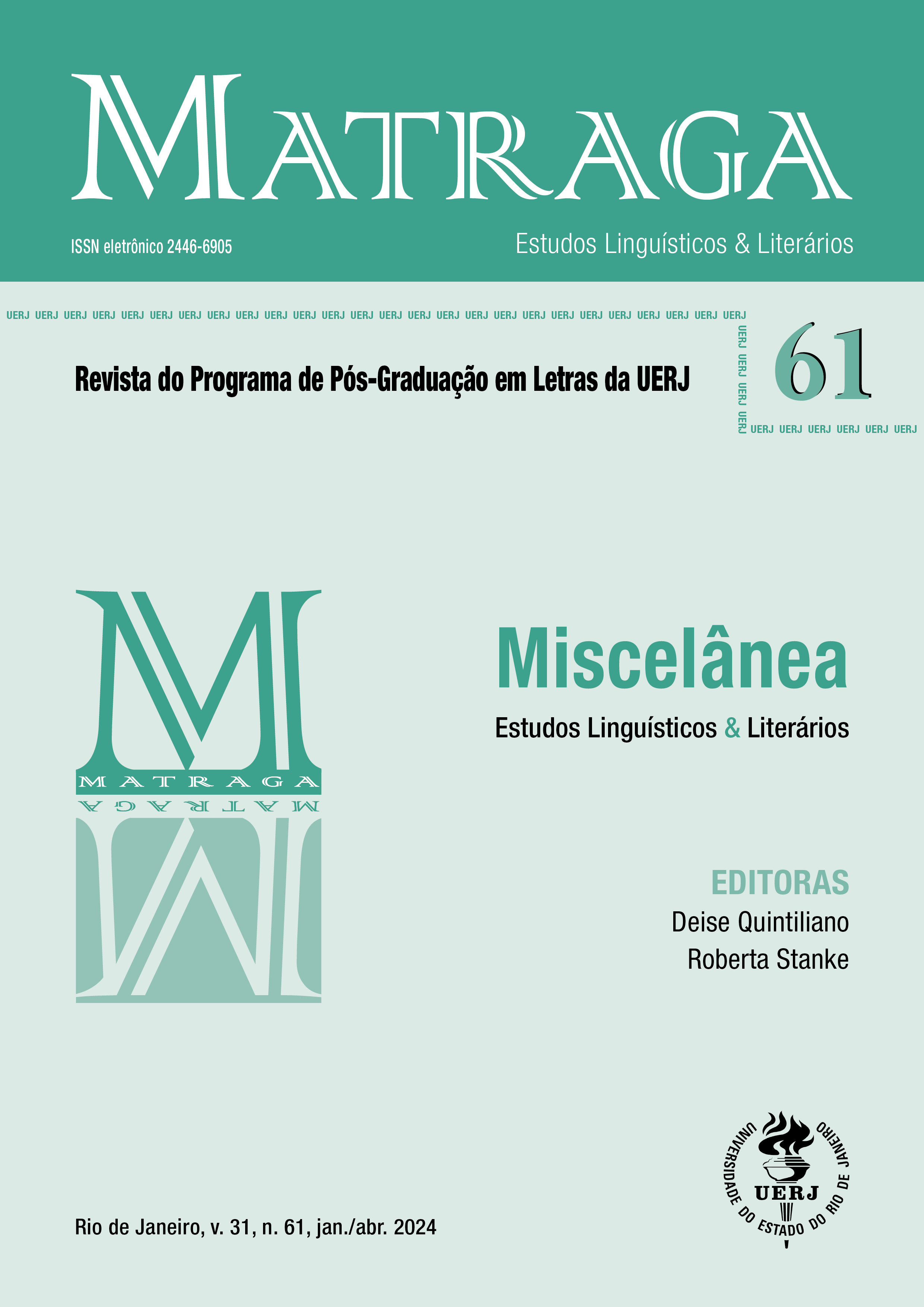O podcast como gênero discursivo-digital: história, usos e definições atuais
DOI:
https://doi.org/10.12957/matraga.2024.77272Palavras-chave:
ItemNet, Podcast, Gênero discursivo, Gênero digitalResumo
O presente texto constitui um estudo sobre o podcast, definido por Rezende (2007, p. 2) como um “sistema de produção e difusão de conteúdos sonoros pela internet”. Apesar do amplo acesso, observamos que há uma escassez da literatura sobre o assunto. O podcast é uma presença constante em diversas esferas de nossa vida cotidiana e sua grande versatilidade torna sua definição bastante complexa. Portanto, é necessária uma proposta taxonômica em relação ao seu uso. Com base na classificação de Carvalho, Aguiar e Marciel (2009), bem como nas pesquisas de Uchôa (2010), Jesus (2014) e Cardoso (2021), que exploraram a integração do podcast em práticas pedagógicas, e em Oliveira (2018), que focou no âmbito jornalístico, buscamos estabelecer uma nova taxonomia que englobasse aspectos relevantes para a compreensão do podcast. Como resultado, ampliamos e criamos doze categorias, considerando tanto os aspectos funcionais quanto formais de sua composição. Assim, sendo o podcast um gênero versátil e dinâmico, e ainda que ele opte pelo áudio como seu principal meio, ele não é construído de maneira aleatória. Além disso, um podcast se desenvolve com base em padrões que são responsáveis por sua materialização. Portanto, com base na abordagem de Bakhtin (2006 [1952-1953]) e nas pesquisas de Marcuschi (2008), podemos afirmar que o podcast se configura como um gênero, admitido como um “ItemNet” (MATOS, 2020; 2022) de suporte.
Downloads
Referências
ARAÚJO, Rafael; FEDICZKO, Igor. Impactos do mp3 na música: reprodutibilidade, compartilhamento e re¬gressão. Revista autora, n. 12, p. 163-175, 2011. Disponível em: <https://revistas.pucsp.br/index.php/aurora/article/view/7418/5401>. Acesso 04 nov. 2023.
BAKHTIN, Mikhail. A estética da criação verbal. São Paulo: Martins Fontes, 2006[1952-1953].
CARDOSO, Gabriela Pedroso. O podcast nas aulas de Língua Portuguesa: práticas de multiletramento na escola. Dissertação (Mestrado em Letras) – Universidade Estadual Paulista, Faculdade de Ciências e Letras, Assis, 2021.
CARVALHO, Ana Amélia Amorim; AGUIAR, Cristina; MACIEL, Romana. A Taxonomy of Podcasts and its Application to Higher Education. ALT-C, p. 132-140, 2009. Disponível em: <http://repositorium.sdum.uminho.pt/bitstream/1822/10040/1/Carvalho%20et%20al%20-ALT-C%202009.pdf>. Acesso em: 26 nov. 2021.
CASTRO, Gisela G. S. Podcasting e consumo cultural. E-Compós, [S. l.], v. 4, 2005. Disponível em: <https://www.e-compos.org.br/e-compos/article/view/53>. Acesso em: 30 nov. 2021.
DE AMORIM, Diego Felipe Borges. Softwares de sistemas e de aplicações livres: benefícios e limitações no uso dessas tecnologias nos negócios. Revista Semana Acadêmica, ano MMXV, n. 000069, 2015. Disponível em: <https://semanaacademica.org.br/artigo/softwares-de-sistemas-e-de-aplicacoes-livres-beneficios-e-limitacoes-no-uso-dessas>. Acesso em: 06 nov. 2023.
FREIRE, Eugênio Paccelli Aguiar. Conceito educativo de podcast: um olhar para além do foco técnico. Edu¬cação, Formação & Tecnologias, v. 6, n. 1, p. 35-51, 2013. Disponível em: <https://dialnet.unirioja.es/servlet/articulo?codigo=5021361> Acesso em: 29 nov. 2021.
FREIRE, Eugênio Paccelli Aguiar. Podcast: breve história de uma nova tecnologia educacional. Educação em Revista, Marília, v. 18, n. 2, p. 55-70, 2017. Disponível em: <https://revistas.marilia.unesp.br/index.php/educacaoemrevista/article/view/7414> Acesso em: 05 jun. 2022.
GAROFALO, Débora. Como usar os gêneros digitais em sala de aula. Nova Escola, 2018. Disponível em: <https://novaescola.org.br/conteudo/11857/como-usar-os-generos-digitais-em-sala-de-aula>. Acesso em: 09 mar. 2022.
JESUS, Wagner Brito de. Podcast e educação: um estudo de caso. Dissertação (Mestrado em Biociências) – Universidade Estadual Paulista, Instituto de Biociências de Rio Claro, 2014.
LENHARO, Rayane Isadora; CRISTOVÃO, Vera Lúcia Lopes. Podcast, Participação Social e Desenvolvimento. Educação em Revista, Belo Horizonte, v. 32, n. 1, p. 307-335, 2016. Disponível em: <https://www.scielo. br/j/edur/a/fqTjw5mQ9ZLYBVCjdLDsxSm/abstract/?lang=pt>. Acesso em: 20 mar. 2022.
LUIZ, Lucio; ASSIS, Pablo de. O Podcast no Brasil e no Mundo: um caminho para a distribuição de mídias digitais. In: Congresso Brasileiro de Ciências da Comunicação, 13, Caxias do Sul, 2010, Anais Caxias do Sul: Intercom, 2010, p. 1-15. Disponível em: <http://www.intercom.org.br/papers/nacionais/2010/resumos/r5-0302-1.pdf>. Acesso em: 23 nov. 2021.
LUIZ, Lucio. Reflexões sobre o podcast. Marsupial Editora: Nova Iguaçu/Rio de Janeiro, 2014.
MARCUSCHI, Luiz Antônio. Produção textual, análise de gêneros e compreensão. São Paulo: Parábola Editorial, 2008.
MATOS, Denilson Pereira de. FVNexA: ferramentas virtuais não exclusivas à aprendizagem em tempos de COVID-19. João Pessoa: Editora UFPB, 2020.
MATOS, Denilson Pereira de. FVNexA: agentes, contextos e ItemNet. Curitiba: CRV, 2022.
OLIVEIRA, Paula Cristina Janay Alves de. Tretas e textões em áudio: Historicidades, tecnicidades e sensibilidades de podcasts brasileiros. Dissertação (Mestrado em Comunicação e Cultura Contemporâneas) – Universidade Federal da Bahia, Salvador, 2018.
REZENDE, Djaine Damiati. Podcast: Reinvenção da comunicação sonora. In: Congresso brasileiro de ciências da comunicação, 30. 2007, Santos. Anais Intercom, 2007. p. 1-12. Disponível em: <http://www.intercom.org.br/papers/nacionais/2007/resumos/r0708-1.pdf> Acesso em: 25 fev. 2022.
SILVA, Fernanda Maurício. Talk show: um gênero televisivo entre o jornalismo e o entretenimento. E-Compós, [S. l.], v. 12, n. 1, 2009. DOI: 10.30962/ec.289. Disponível em: <https://www.e-compos.org.br/e-compos/article/view/289>. Acesso em: 6 nov. 2023.
TEIXEIRA, Carla Cristina da Costa. A linguagem visual das vinhetas da mtv: videodesign como expressão da cultura pós-moderna. Dissertação (Mestrado em Design) Pontifícia Universidade Católica do Rio de Ja¬neiro, Rio de Janeiro, 2006.
UCHÔA, José Mauro Souza. O gênero podcast educacional: descrição do conteúdo temático, estilo e cons¬trução composicional. Dissertação (Mestrado em Letras – Linguagem e Identidade) – Universidade Federal do Acre, Rio Branco, 2010.
Downloads
Publicado
Como Citar
Edição
Seção
Licença

Este trabalho está licenciado sob uma licença Creative Commons Attribution-NonCommercial 4.0 International License.
AUTORIZAÇÃO
A Matraga – Revista do Programa de Pós-Graduação em Letras da UERJ está autorizada a publicar o artigo ora submetido, caso seja aceito para publicação online. Fica atestado que a contribuição é original, que não está sendo submetida a outro editor para publicação, e que a presente declaração é a expressão da verdade.
Os trabalhos publicados no espaço virtual da Matraga – Revista do Programa de Pós-Graduação em Letras da UERJ serão automaticamente cedidos, ficando os seus direitos autorais reservados à Matraga. Sua reprodução, total ou parcial, é condicionada à citação dos autores e dos dados da publicação.

A Matraga utiliza uma Licença Creative Commons - Atribuição-NãoComercial 4.0 Internacional.





